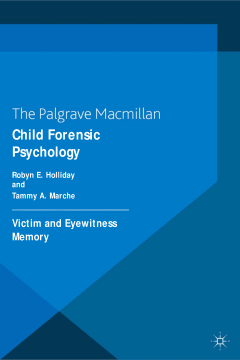
Additional Information
Book Details
Abstract
Why would a child invent a memory of something that never happened? How reliable can a memory be when it is recalled years after the event? Child Forensic Psychology tackles the controversial questions that lie between forensic and developmental psychology.
By examining the issues that surround children's status as eyewitnesses and victims, the book relates current theory to real-life examples drawn from criminal and family courts. Breaking down the ways in which psychologists deal with these difficult issues, the book will be a vital resource for students and practitioners alike.
Key features of Child Forensic Psychology:
* Topical case studies, taken from the UK and around the world
* Coverage of the very latest theories and research
* Unique chapter investigating the psychology of missing and abducted children
Written by a collection of leading researchers and practitioners, Child Forensic Psychology is an indispensable guide that shines a light on the psychology of children in the courtroom.
"Using contemporary examples to illustrate the key concepts and concerns of children's ability to give accurate and reliable testimony, Holliday and Marche underscore the importance of understanding this complex issue. Drawing upon specially selected, leading experts, this book covers a uniquely wide range of perspectives making it a must for both students, and for the specialist researcher." – Dr Charlotte Coleman, Forensic and Investigative Psychology Research Group, Sheffield Hallam University, UK
"This book extensively covers many child forensic psychology issues, particularly relating to memory and eyewitness testimony, written by an impressive collection of authors. I enjoyed reading it!" – Penny Haney, Ph.D., Boston College, USA.
"This book gathers together international contributions from key players in the field of the psychology of young persons. Collectively the chapters provide a state of the art portrayal of scientific knowledge of current issues in child psychology." – Dr Julian Boon, University of Leicester, UK
Robyn E. Holliday is an academic staff member in the School of Psychology, University of Leicester, UK. She conducts research on true and false memories in children, and forensic interviewing techniques for vulnerable witnesses.
Tammy A. Marche is a faculty member in the Department of Psychology at St. Thomas More College, University of Saskatchewan, Canada. Her research speciality is memory in both theoretical and applied settings, including the issues of suggestibility, children's memory for pain and eyewitness memory.
Table of Contents
| Section Title | Page | Action | Price |
|---|---|---|---|
| Cover | Cover | ||
| Half-Title | i | ||
| Title | iii | ||
| Copyright | iv | ||
| Dedication | v | ||
| Contents | vii | ||
| List of Illustrations | ix | ||
| Acknowledgments | x | ||
| Notes on Contributors | xi | ||
| Introduction | 1 | ||
| 1 Theory and Processes in Memory Development: Infancy and Early Childhood | 9 | ||
| 2 Feats of Early Memory: Courtroom Tales of What Adults Claim to Remember about Early Childhood Events | 39 | ||
| 3 Theory and Processes in Memory Development: Childhood to Adolescence | 65 | ||
| 4 Children as Eyewitnesses: Historical Background, and Factors Affecting Children’s Eyewitness Testimony | 95 | ||
| 5 Children’s Memory for Emotionally Negative Experiences: An Eyewitness Memory Perspective | 119 | ||
| 6 Investigative Interviews of Children | 157 | ||
| 7 The Law and Science of Children’s Testimonial Competency | 179 | ||
| 8 Child Eyewitness Person Descriptions and Lineup Identifi cations | 209 | ||
| 9 The Psychology of the Missing: Missing and Abducted Children | 241 | ||
| 10 Conclusions and Next Steps for Researchers and Practitioners | 273 | ||
| Index | 287 |
